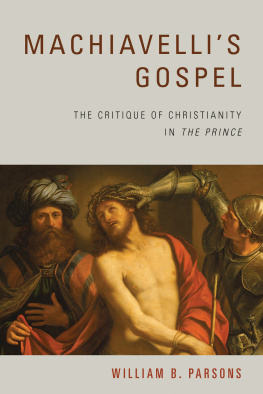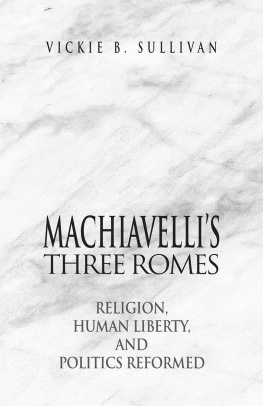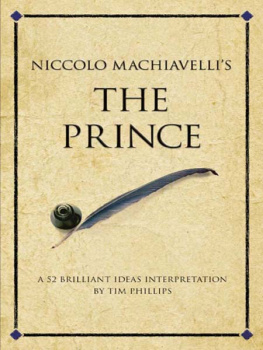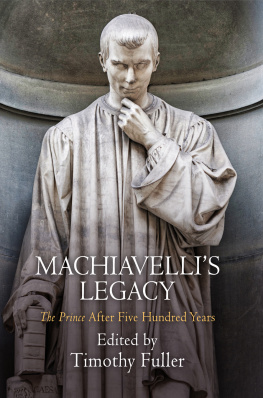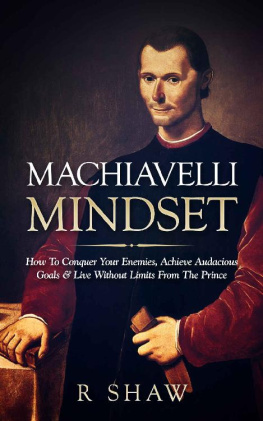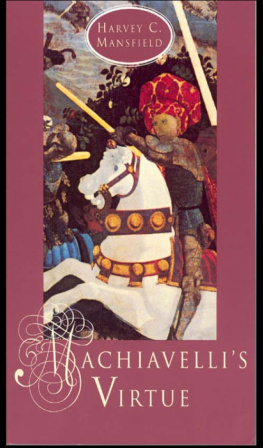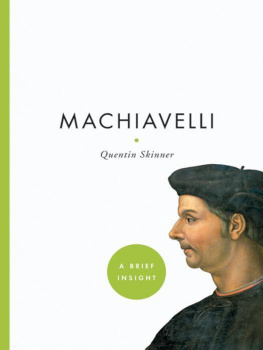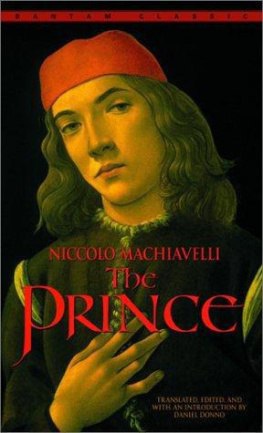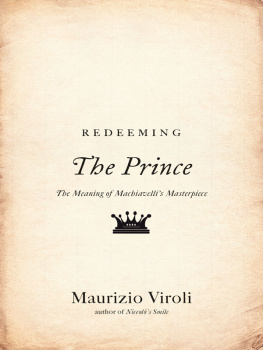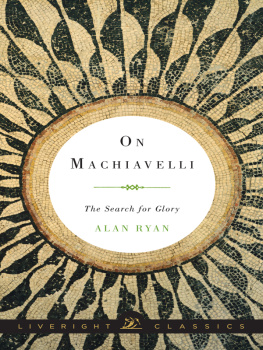MACHIAVELLIS GOSPEL
Recent scholarship on The Prince interprets the classic work in the context of Machiavellis sixteenth-century Italy, but this scholarship neglects the source on which the moral and political world of the sixteenth century was based, the Christian Bible. In this study of The Prince , William Parsons plumbs Machiavellis allusions to the Bible, along with his statements on the church, and shows that Machiavelli was a careful reader of the Bible and an astute observer of the church. Machiavellis teaching in The Prince , Parsons contends, might be instructively compared with that of the churchs teacher, Jesus Christ.
Parsons undertakes what recent interpreters of The Prince have not done: contrast Machiavellis advice with the teachings of Christ. The result is a new reading of The Prince , revealing in Machiavellis political thought a systematic critique of the teachings of the New Testament and its model for human life, Christ. In this study of one of the greatest works on politics ever written, Parsons not only challenges the most recent interpretations of The Prince but also gives new understanding to the reading that made Machiavelli famous.
William Parsons is associate professor of political science at Carroll College.
Machiavellis Gospel makes a unique and substantial contribution to the scholarly literature on Machiavelli. William Parsonss mastery of both Machiavellis texts and the New Testament is impressive, and he executes the confrontation between Machiavelli and Christianity with remarkable thoroughness and subtlety. Nathan Tarcov, University of Chicago.
In this provocative book, William Parsons makes a strong case for reading Machiavellis Prince as a radical and often audacious critique of Christianity. No previous study has so thoroughly examined Machiavellis complex engagements with the Bible, especially the New Testament. By comparing lessons from the Gospels with passages from the Prince and Discourses that seem to subvert the teaching of Christ, Machiavellis Gospel introduces readers to a fascinating and underexplored terrain. Erica Benner, Yale University.

For Heather, with whom all things appear truly possible
No one... should be terrified that he cannot carry out what has been carried out by others, for... men are born, live, and die always in one and the same order.
Discourses I.11.5
CONTENTS
ACKNOWLEDGMENTS
Many people helped me complete this book. First among these is my wife, Heather Barnes. Without her, I would not have an academic career. Moreover, she patiently indulged my penchant for writing in the early mornings and much of the weekends these last five years. Second is my editor, Ryan Peterson, who knew this was a book before I did, and generously loaned maximum support and his keen critical eye. I would not have been in a position to write a book on Machiavelli without the outstanding instruction of Michael Palmer and Clifford Orwin, both of whom are also superior Machiavelli scholars. Their lectures and scholarship, which attend closely to Machiavellis problematic relationship to Christianity, were the true starting point for my inquiry. I am also grateful to the broad community of Machiavelli scholars who have welcomed me into their ranks, despite my astonishing lack of credentials: chief among these are Vickie B. Sullivan, Nathan Tarcov, and Erica Benner, each of whom generously reviewed portions of this work. I thank Alexander Duff and Lorraine Smith Pangle for encouraging my early attempts to examine this subject. I am also grateful to Diego Von Vacano, Thomas L. Pangle, and Guillaume Bogiaris for facilitating my attendance at a Machiavelli workshop at Texas A&M University in February 2014. Many others have reviewed portions of the book: I hope I have profited adequately from the suggestions of Alexandra Hoerl, Benjamin Mitchell, Paul Ulrich, Steven Kelts, Erik Pratt, Jeffrey Metzger, Alexander Orwin, George Crowder, and several anonymous reviewersincluding especially the reviewers obtained by the University of Rochester Press. Like most who study Machiavelli, I am indebted to the translations by Harvey C. Mansfield and Nathan Tarcov, who also accomplish herculean interpretive work in their revealing footnotes. Several individuals at my institution helped me: the staff of the Office of the Vice President of Academic Affairs, especially Paula McNutt; Vicki Kirk; Heather Navratil and Kathy Martin at the Corette Library; the Faculty Development Committee; and the members of the Department of Political Science and International Relations supported me in every possible way. Brian Matz and Gerardo Rodriguez charitably fielded my naive questions about the Bible and Christian history. Elvira Roncalli graciously intervened to resolve my most troublesome confusions about Machiavellis Italian; Donald Jacques displayed his characteristic generosity when fielding myriad questions about Latin and Greek. Henry Jorden, Elizabeth Rabishaw, and Heather Barnes helped to prepare the manuscript, which Robert Fullilove improved with his skillful copyediting and informed judgment. It was my good fortune to work with a copy editor familiar with the New Testament. I also thank the editorial and publicity staff at the University of Rochester Press for their efficient and meticulously professional work. Finally, I wish to thank my daughter, Eudora Rose Barnes, who has recently made my burden especially light. As a comfort to all to whom I owe so much, I remind the reader that any errors, misinterpretations, or mistranslations are mine alone.
INTRODUCTION
Christianity, Christ, and Machiavellis The Prince
Machiavelli is a radical critic of the Church, the teachings it propagates, and its founder.
Attention to Machiavellis critique of Christ in The Prince clarifies his intention in writing the book, which I maintain is largely definedand limitedby his goals regarding the Church and Christianity. Most of the existing scholarship concerning Machiavellis view of Christianity limits its analysis to the Discourses on Livy , problematically focuses on Machiavellis presumed private attitudes toward religion, attributes Machiavellis most cynical statements about religion to the influence of his intellectual milieu, or excuses Machiavellis troubling statements regarding Christianity with The Prince communicates this opposition most clearly. By attending to this infamous book, I hope to clarify Machiavellis broadest vision for modern politics, which consists in the abandonment of Christ as a model for human life and the reformation of European politics along Machiavellian lines, and in accordance with Machiavellian goals of material prosperity, human flourishing, and eventually, liberty.
Machiavellis Life and Works
Born in Florence in 1469, Machiavelli was, in part, a creature of the Renaissance. Nonetheless, he would seek to transcend that movement in his greatest works. He enjoyed a long and varied careeras a poet, comedian, historian, diplomat, and civil servantbut by his own admission, his life was most clearly marked by a sustained dialogue with the ancient works that the Renaissance made accessible to fifteenth-century Italians: Lucretius, Xenophon, Polybius, Herodian, Livy, and Plutarch are among the authors with whom Machiavelli communed during his philosophical ruminations.their world. This project led Machiavelli to confront directly the Church and Christianity, which stood as the most decisive impediments to the change he sought to engender.
Machiavellis relationship to Christianity is both complex and hotly contested. He lived during a period (14691527) of profound corruption within the Catholic Church, and his writings are replete with condemnatory accounts of the Church and its prelates. His experience with the iniquity of the Renaissance Church led him, like many of the humanists of his day, to criticize its political influence in Italy and Europe. Like many Italian humanists, Machiavelli sometimes criticizes the Church in language that might have earned him excommunication fifty years later, during the Counter-Reformation: indeed, The Prince would appear on the first index of books banned by the Catholic Church.

